Unit 4 Earthquakes 重点词汇及语法
文档属性
| 名称 | Unit 4 Earthquakes 重点词汇及语法 |
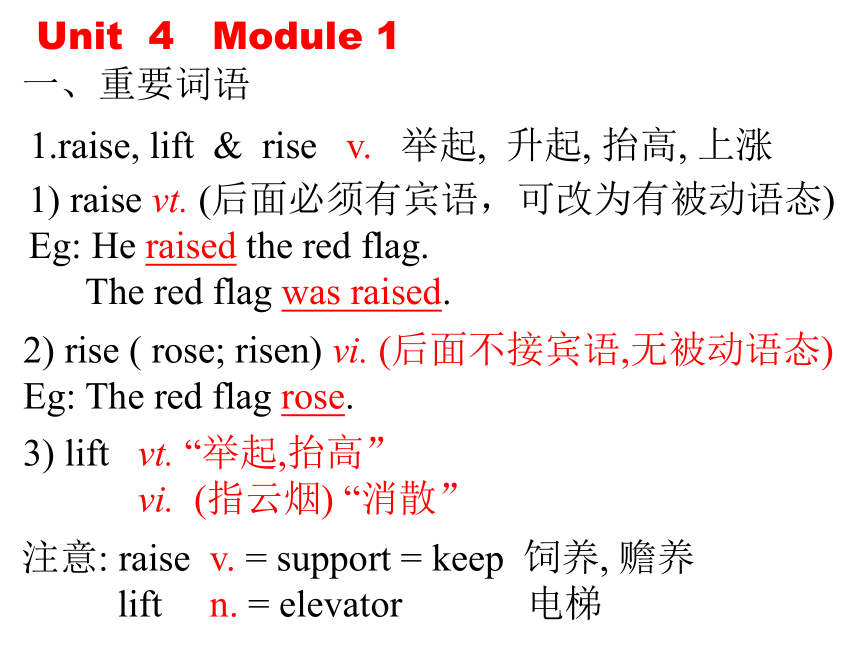
|
|
| 格式 | rar | ||
| 文件大小 | 20.4KB | ||
| 资源类型 | 教案 | ||
| 版本资源 | 人教版(新课程标准) | ||
| 科目 | 英语 | ||
| 更新时间 | 2010-12-04 00:00:00 | ||
图片预览

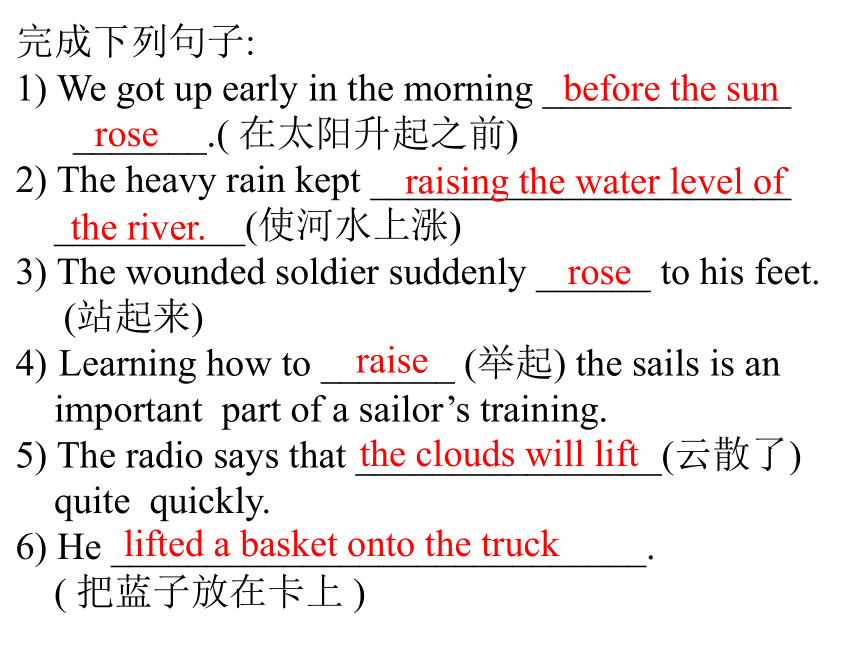
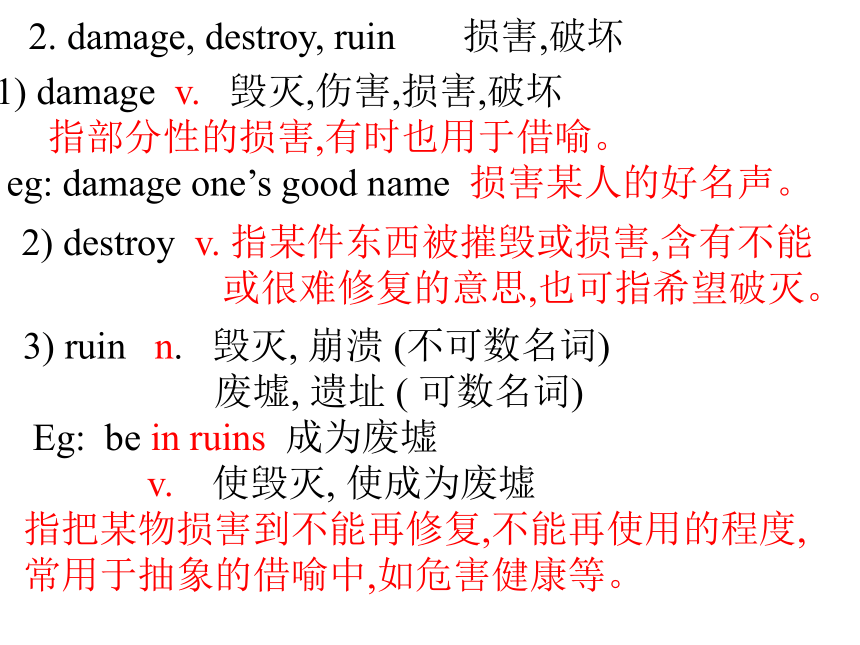
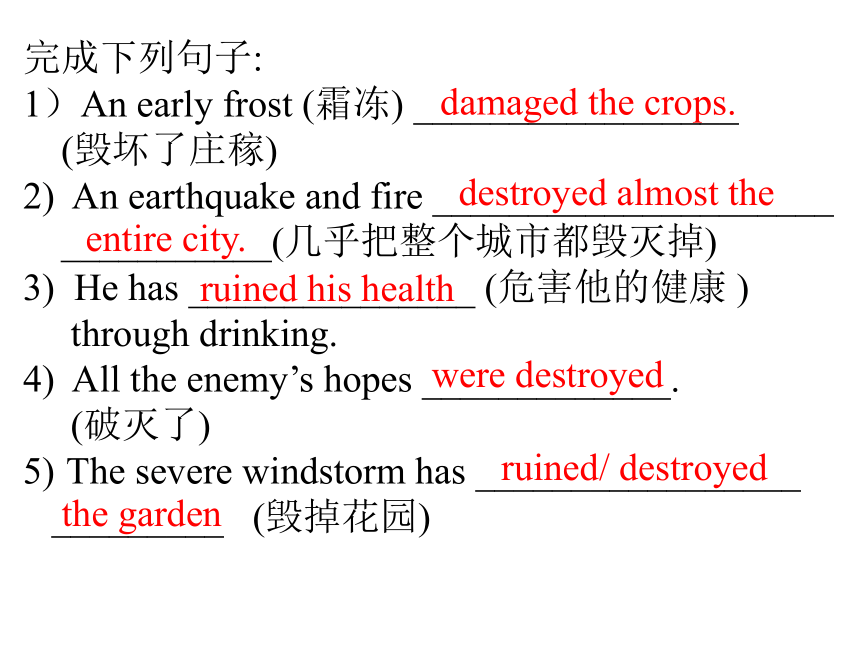

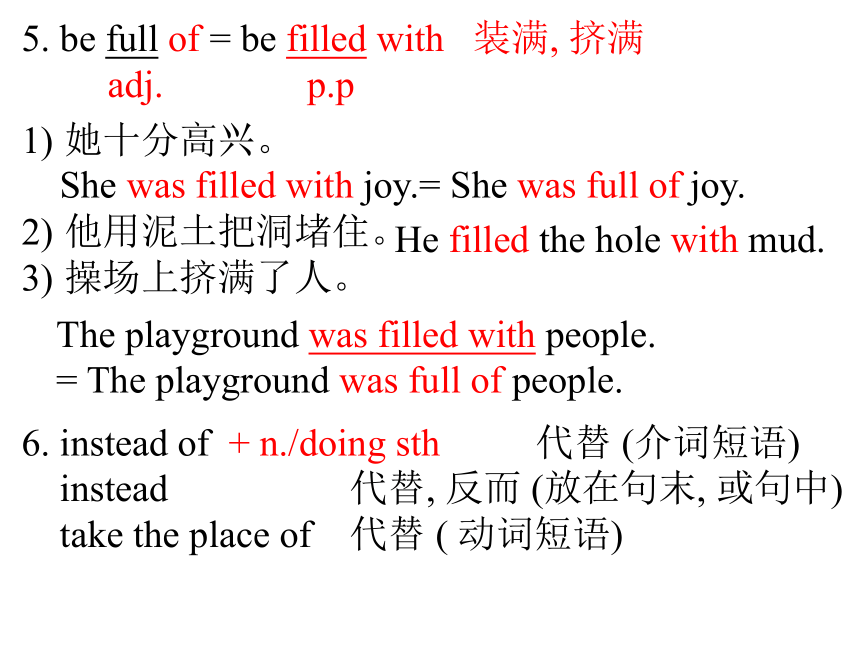
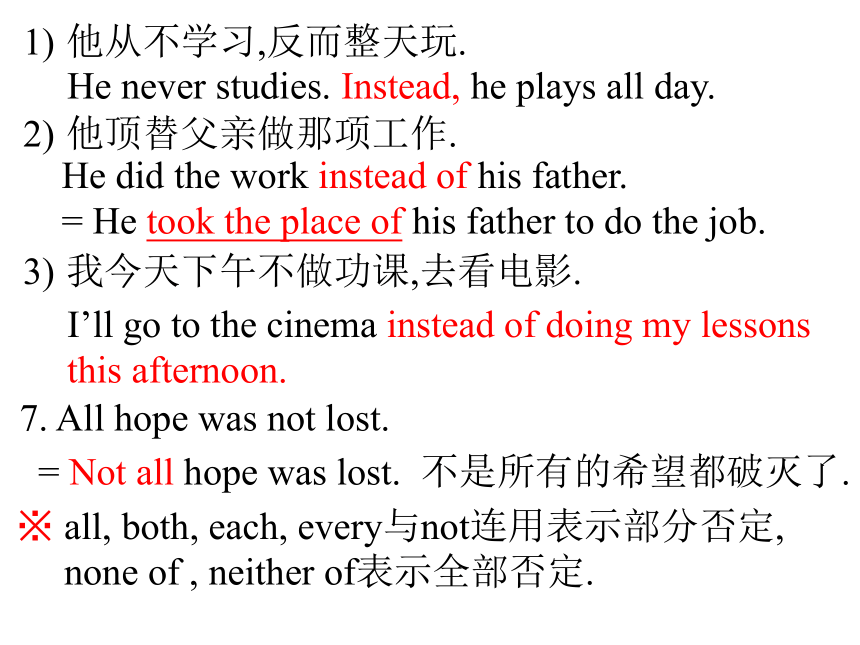
文档简介
课件17张PPT。Unit 4 Module 1一、重要词语1.raise, lift & rise v. 举起, 升起, 抬高, 上涨 1) raise vt. (后面必须有宾语,可改为有被动语态)
Eg: He raised the red flag.
The red flag was raised.2) rise ( rose; risen) vi. (后面不接宾语,无被动语态)
Eg: The red flag rose. 3) lift vt. “举起,抬高”
vi. (指云烟) “消散”注意: raise v. = support = keep 饲养, 赡养
lift n. = elevator 电梯 完成下列句子:
1) We got up early in the morning _____________
_______.( 在太阳升起之前)
2) The heavy rain kept ______________________
__________(使河水上涨)
3) The wounded soldier suddenly ______ to his feet.
(站起来)
Learning how to _______ (举起) the sails is an
important part of a sailor’s training.
5) The radio says that ________________(云散了)
quite quickly.
6) He ____________________________.
( 把蓝子放在卡上 ) before the sun
rose raising the water level of
the river.roseraisethe clouds will lift lifted a basket onto the truck 2. damage, destroy, ruin 损害,破坏1) damage v. 毁灭,伤害,损害,破坏
指部分性的损害,有时也用于借喻。
eg: damage one’s good name 损害某人的好名声。 2) destroy v. 指某件东西被摧毁或损害,含有不能
或很难修复的意思,也可指希望破灭。 3) ruin n. 毁灭, 崩溃 (不可数名词)
废墟, 遗址 ( 可数名词)
Eg: be in ruins 成为废墟
v. 使毁灭, 使成为废墟
指把某物损害到不能再修复,不能再使用的程度,
常用于抽象的借喻中,如危害健康等。完成下列句子:
1)An early frost (霜冻) _________________
(毁坏了庄稼)
2) An earthquake and fire _____________________
___________(几乎把整个城市都毁灭掉)
3) He has _______________ (危害他的健康 )
through drinking.
4) All the enemy’s hopes _____________.
(破灭了)
The severe windstorm has _________________
_________ (毁掉花园)damaged the crops. destroyed almost the
entire city.ruined his health were destroyed ruined/ destroyed
the garden 3. agree with sb. 同意某人(的话, 意见);
适合某人,合某人胃口
agree to do sth 同意某人做某事
agree to + n. 同意(计划, 安排)
agree on sth 在某事上意见一致(达成协议)
= reach an agreement on sth
I can’t agree more with you.我非常赞同你的观点.4. in surprise = surprisingly 惊奇地, 出乎意料地
to one’s surprise 使某人惊奇的是
give sb a surprise 给某人一个惊喜
be surprised 感到惊奇
be surprised to do sth 做某事很惊奇
= be surprised at doing sth5. be full of = be filled with 装满, 挤满
adj. p.p她十分高兴。
他用泥土把洞堵住。
操场上挤满了人。She was filled with joy.= She was full of joy.He filled the hole with mud.The playground was filled with people.
= The playground was full of people.6. instead of + n./doing sth 代替 (介词短语)
instead 代替, 反而 (放在句末, 或句中)
take the place of 代替 ( 动词短语)他从不学习,反而整天玩.
他顶替父亲做那项工作.
我今天下午不做功课,去看电影.He never studies. Instead, he plays all day.He did the work instead of his father.
= He took the place of his father to do the job.I’ll go to the cinema instead of doing my lessons
this afternoon.7. All hope was not lost. = Not all hope was lost. 不是所有的希望都破灭了.※ all, both, each, every与not连用表示部分否定,
none of , neither of表示全部否定.闪光的并不都是金子。
不是两个答案都对。
不是所有的学生都能上大学。
不是每个老师都同意他的观点。
他们两个都不对。
我们全都不允许去那里。All that glitters is not gold.= Some is gold, some isnt. Both the answers are not right.
= One is right, the other is wrong. Not all students can be accepted into a university. Not every teacher agreeed with him.Neither of them is right.None of us is allowed to go there.8.injure, wound, hurt 受伤,伤害1)injure v. (正式用语) 伤害, 损害(健康,成就,容貌)
n. injury 伤痛 ; adj. injured 受伤的
2)hurt v. (肉体,感情,精神) 弄伤,伤害, 难过
3)wound v.& n. (指刀枪刺) 伤, 也指精神上的创伤那位司机在事故中伤得很严重。
你的话使他很难过。
一颗子弹伤了他的右眼。
喝酒对人的健康有害。That driver hurt himself badly in the accident.He felt deeply hurt at your words.A bullet wounded ( injured ) his right eye.Drinking can injure one’s health.9. imagine v. 想象,设想
imagine + n./ doing 想象在做…
imagine + that clause
I imagine = I think + that clause
(从句是否定句时,要进行否定转移)
4) imagine oneself to do sth 设想某人自己在做…试着想象在月球上生活。
我认为如果下雨他们就不会来了。
设想你处于他地位的情形。Try to imagine living on the moon.I don’t imagine that they will come if it rains.Imagine yourself to be in his place.10. shake – shook –shaken v. 震动,颤抖,摇动
1) shake one’s hands 与某人握手
= shake hands with sb = shake sb by the hand
2) shake one’s head 摇头
3) be shaken 被震动, 被感动了,被震惊
4) shake with fear 害怕的发抖11. direction
1) 方向, 方面
eg: in all directions 向四面八方
in every direction 朝着每个方向 2) 指导, 指示
Eg: follow one’s direction 遵循某人的指示
under the direction of sb 在某人的指挥下 12. breath n. 呼吸, 气息
hold one’s breath 憋住气
take breath 喘口气
be out of breath 上气不接下气
breathe v. 呼吸13. judge v. 判断
※ judge …by… 根据…来判断
judging from / by (介词短语) 根据…可以看出
as far as I can judge 就我判断
我不能根据穿着来衡量一个人。
根据他的穿着可以看出他出生于富裕家庭。We can’t judge a man by the clothes he wears.Judging from his wearing, I guess he comes from
a wealthy family.14. burst v. 爆裂, 爆发, 突发
bursting n. = outbreak 破裂, 爆发※1) burst into tears/laughter/song 突然哭/笑/唱起来
= burst out crying/laughing/singing
2) be bursting to do sth 急于做某事
3) a burst of laughter / applause 一阵大笑/喝彩声 他正在骑车的时候, 车胎爆裂了.
房子一下子烧起来了.When he was riding a bike, the tire burst.The house burst into flames.先行词: 被定语从句修饰的词叫先行词.
关系词:引导定语从句的词叫关系词.
Eg:This was the room where I was born.(先行词)(关系词)3. 引导定语从句的关系词有: that, which,
who, whom, whose, where, when,why, asthat: 指 “人” 或“物”,在从句中作主语或宾语。
Eg:This is the book (that) I want to buy.(宾语可省去)
He is the man that teaches us English this term.2) which: 只指“物” (在从句中作主语和宾语)3) who: 只指“人”(在从句中作主语和宾语)
4) whom: 只指“人”(在从句中作宾语)定语从句:修饰名词的句子叫定语从句。5) whose 相当于物主代词,后面接名词Eg:The boy whose sister studies in Beijing University
is my classmate.6) when 指时间
Eg: 1949 is the year when new China was born.7) where 指地点
Eg: This is the factory where my father works.4. 限制性定语从句: 无逗号
非限制性定语从句: 有逗号Mr Hu who is my friend’s father is a good teacher.
Mr Hu , who is my friend’s father, is a good teacher.5.as引导的定语从句,常和the same, such连用。
Eg: This is the same pen as I lost yesterday.As放在句首,意思为“正如…一样”。
As is proved above, light travels faster than sound.6.the way 后面的定语从句,可用
(which,that, in which )引导, 也可省去关系代词.Eg:1) I like the way ______ he explain the text to us.
A. in which B. that C / D. All of the above
2) This is the way _____ he lives in England.
A. which B. that C/ D. A,B and CDDEg:1) This is the first time ___ I have come to Beijing.
A. when B. that C / D. B and C
2)There was a time ___ I hated my head teacher.
A. when B. that C. / D. B and CDA7. time 后面的定语从句
1) time 表示次数,用that引导或省去that;
2) time表示时间用when引导.
Eg: He raised the red flag.
The red flag was raised.2) rise ( rose; risen) vi. (后面不接宾语,无被动语态)
Eg: The red flag rose. 3) lift vt. “举起,抬高”
vi. (指云烟) “消散”注意: raise v. = support = keep 饲养, 赡养
lift n. = elevator 电梯 完成下列句子:
1) We got up early in the morning _____________
_______.( 在太阳升起之前)
2) The heavy rain kept ______________________
__________(使河水上涨)
3) The wounded soldier suddenly ______ to his feet.
(站起来)
Learning how to _______ (举起) the sails is an
important part of a sailor’s training.
5) The radio says that ________________(云散了)
quite quickly.
6) He ____________________________.
( 把蓝子放在卡上 ) before the sun
rose raising the water level of
the river.roseraisethe clouds will lift lifted a basket onto the truck 2. damage, destroy, ruin 损害,破坏1) damage v. 毁灭,伤害,损害,破坏
指部分性的损害,有时也用于借喻。
eg: damage one’s good name 损害某人的好名声。 2) destroy v. 指某件东西被摧毁或损害,含有不能
或很难修复的意思,也可指希望破灭。 3) ruin n. 毁灭, 崩溃 (不可数名词)
废墟, 遗址 ( 可数名词)
Eg: be in ruins 成为废墟
v. 使毁灭, 使成为废墟
指把某物损害到不能再修复,不能再使用的程度,
常用于抽象的借喻中,如危害健康等。完成下列句子:
1)An early frost (霜冻) _________________
(毁坏了庄稼)
2) An earthquake and fire _____________________
___________(几乎把整个城市都毁灭掉)
3) He has _______________ (危害他的健康 )
through drinking.
4) All the enemy’s hopes _____________.
(破灭了)
The severe windstorm has _________________
_________ (毁掉花园)damaged the crops. destroyed almost the
entire city.ruined his health were destroyed ruined/ destroyed
the garden 3. agree with sb. 同意某人(的话, 意见);
适合某人,合某人胃口
agree to do sth 同意某人做某事
agree to + n. 同意(计划, 安排)
agree on sth 在某事上意见一致(达成协议)
= reach an agreement on sth
I can’t agree more with you.我非常赞同你的观点.4. in surprise = surprisingly 惊奇地, 出乎意料地
to one’s surprise 使某人惊奇的是
give sb a surprise 给某人一个惊喜
be surprised 感到惊奇
be surprised to do sth 做某事很惊奇
= be surprised at doing sth5. be full of = be filled with 装满, 挤满
adj. p.p她十分高兴。
他用泥土把洞堵住。
操场上挤满了人。She was filled with joy.= She was full of joy.He filled the hole with mud.The playground was filled with people.
= The playground was full of people.6. instead of + n./doing sth 代替 (介词短语)
instead 代替, 反而 (放在句末, 或句中)
take the place of 代替 ( 动词短语)他从不学习,反而整天玩.
他顶替父亲做那项工作.
我今天下午不做功课,去看电影.He never studies. Instead, he plays all day.He did the work instead of his father.
= He took the place of his father to do the job.I’ll go to the cinema instead of doing my lessons
this afternoon.7. All hope was not lost. = Not all hope was lost. 不是所有的希望都破灭了.※ all, both, each, every与not连用表示部分否定,
none of , neither of表示全部否定.闪光的并不都是金子。
不是两个答案都对。
不是所有的学生都能上大学。
不是每个老师都同意他的观点。
他们两个都不对。
我们全都不允许去那里。All that glitters is not gold.= Some is gold, some isnt. Both the answers are not right.
= One is right, the other is wrong. Not all students can be accepted into a university. Not every teacher agreeed with him.Neither of them is right.None of us is allowed to go there.8.injure, wound, hurt 受伤,伤害1)injure v. (正式用语) 伤害, 损害(健康,成就,容貌)
n. injury 伤痛 ; adj. injured 受伤的
2)hurt v. (肉体,感情,精神) 弄伤,伤害, 难过
3)wound v.& n. (指刀枪刺) 伤, 也指精神上的创伤那位司机在事故中伤得很严重。
你的话使他很难过。
一颗子弹伤了他的右眼。
喝酒对人的健康有害。That driver hurt himself badly in the accident.He felt deeply hurt at your words.A bullet wounded ( injured ) his right eye.Drinking can injure one’s health.9. imagine v. 想象,设想
imagine + n./ doing 想象在做…
imagine + that clause
I imagine = I think + that clause
(从句是否定句时,要进行否定转移)
4) imagine oneself to do sth 设想某人自己在做…试着想象在月球上生活。
我认为如果下雨他们就不会来了。
设想你处于他地位的情形。Try to imagine living on the moon.I don’t imagine that they will come if it rains.Imagine yourself to be in his place.10. shake – shook –shaken v. 震动,颤抖,摇动
1) shake one’s hands 与某人握手
= shake hands with sb = shake sb by the hand
2) shake one’s head 摇头
3) be shaken 被震动, 被感动了,被震惊
4) shake with fear 害怕的发抖11. direction
1) 方向, 方面
eg: in all directions 向四面八方
in every direction 朝着每个方向 2) 指导, 指示
Eg: follow one’s direction 遵循某人的指示
under the direction of sb 在某人的指挥下 12. breath n. 呼吸, 气息
hold one’s breath 憋住气
take breath 喘口气
be out of breath 上气不接下气
breathe v. 呼吸13. judge v. 判断
※ judge …by… 根据…来判断
judging from / by (介词短语) 根据…可以看出
as far as I can judge 就我判断
我不能根据穿着来衡量一个人。
根据他的穿着可以看出他出生于富裕家庭。We can’t judge a man by the clothes he wears.Judging from his wearing, I guess he comes from
a wealthy family.14. burst v. 爆裂, 爆发, 突发
bursting n. = outbreak 破裂, 爆发※1) burst into tears/laughter/song 突然哭/笑/唱起来
= burst out crying/laughing/singing
2) be bursting to do sth 急于做某事
3) a burst of laughter / applause 一阵大笑/喝彩声 他正在骑车的时候, 车胎爆裂了.
房子一下子烧起来了.When he was riding a bike, the tire burst.The house burst into flames.先行词: 被定语从句修饰的词叫先行词.
关系词:引导定语从句的词叫关系词.
Eg:This was the room where I was born.(先行词)(关系词)3. 引导定语从句的关系词有: that, which,
who, whom, whose, where, when,why, asthat: 指 “人” 或“物”,在从句中作主语或宾语。
Eg:This is the book (that) I want to buy.(宾语可省去)
He is the man that teaches us English this term.2) which: 只指“物” (在从句中作主语和宾语)3) who: 只指“人”(在从句中作主语和宾语)
4) whom: 只指“人”(在从句中作宾语)定语从句:修饰名词的句子叫定语从句。5) whose 相当于物主代词,后面接名词Eg:The boy whose sister studies in Beijing University
is my classmate.6) when 指时间
Eg: 1949 is the year when new China was born.7) where 指地点
Eg: This is the factory where my father works.4. 限制性定语从句: 无逗号
非限制性定语从句: 有逗号Mr Hu who is my friend’s father is a good teacher.
Mr Hu , who is my friend’s father, is a good teacher.5.as引导的定语从句,常和the same, such连用。
Eg: This is the same pen as I lost yesterday.As放在句首,意思为“正如…一样”。
As is proved above, light travels faster than sound.6.the way 后面的定语从句,可用
(which,that, in which )引导, 也可省去关系代词.Eg:1) I like the way ______ he explain the text to us.
A. in which B. that C / D. All of the above
2) This is the way _____ he lives in England.
A. which B. that C/ D. A,B and CDDEg:1) This is the first time ___ I have come to Beijing.
A. when B. that C / D. B and C
2)There was a time ___ I hated my head teacher.
A. when B. that C. / D. B and CDA7. time 后面的定语从句
1) time 表示次数,用that引导或省去that;
2) time表示时间用when引导.
